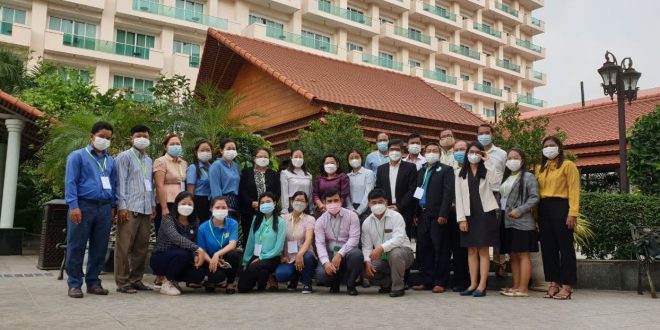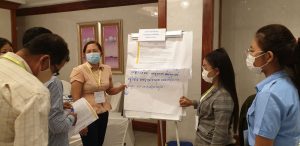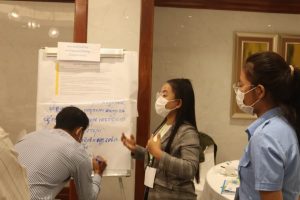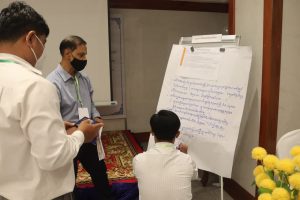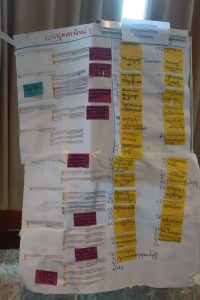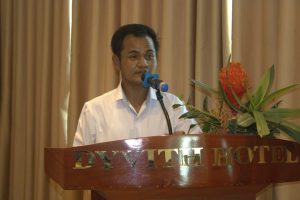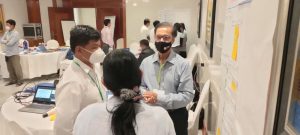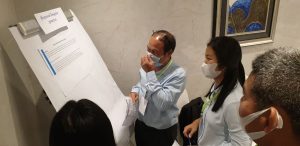on 25-26 January 2022 at Dyvith Hotel, Phnom Penh, CamboDHRRA, in collaboration with AsiaDHRRA, FAO and the Ministry of Agriculture Forestry and Fisheries (MAFF) jointly organized the Learning Needs Assessment Validation Workshop – Empowering women and youth in responsible investments in agriculture and food systems.
The Learni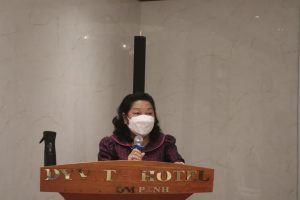 ng Needs Assessment validation workshop gathered 32 participants (14 women) from several organizations playing a strategic role to engage women and youth in RAI, including representatives of government from Ministry of Agriculture, Forestry and Fisheries (MAFF) and Ministry of Women Affairs (MoWA), civil society organizations/NGOs, farmer organizations, cooperatives, private companies and academia.
ng Needs Assessment validation workshop gathered 32 participants (14 women) from several organizations playing a strategic role to engage women and youth in RAI, including representatives of government from Ministry of Agriculture, Forestry and Fisheries (MAFF) and Ministry of Women Affairs (MoWA), civil society organizations/NGOs, farmer organizations, cooperatives, private companies and academia.
The workshop was presided over by H.E Hor Malin, Secretary of State of Ministry of Agriculture Forestry and Fisheries (MAFF) and the Chair of the Child and Gender Working Group, Mr. Oum Kosal, Assistant of FAO Representative, FAO Cambodia and Mr. Pan Sopheap, Chairman of CamboDHRRA.
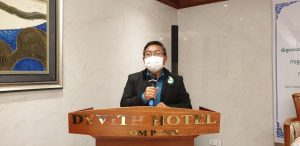 Mr. Pan Sopheap, Chairman of CamboDHRRA welcomed the participants by expressing the pleasure of in-person meeting with stakeholders immediately after the Prime Minister announced the reopening of the country after the Covid-19. This face-to-face meeting may provide more important elements than the indirect Zoom Meeting, which will enable stakeholders to gain greater clarity and provide key inputs on the Learning Need Assessment. Women have important role in agriculture and food systems, from farm to customer gate while youth is the future of agriculture and food system. The empowering youth and women in agriculture and food system investment will help to secure the food security and economic growth especially, contribution to SDGs.
Mr. Pan Sopheap, Chairman of CamboDHRRA welcomed the participants by expressing the pleasure of in-person meeting with stakeholders immediately after the Prime Minister announced the reopening of the country after the Covid-19. This face-to-face meeting may provide more important elements than the indirect Zoom Meeting, which will enable stakeholders to gain greater clarity and provide key inputs on the Learning Need Assessment. Women have important role in agriculture and food systems, from farm to customer gate while youth is the future of agriculture and food system. The empowering youth and women in agriculture and food system investment will help to secure the food security and economic growth especially, contribution to SDGs.
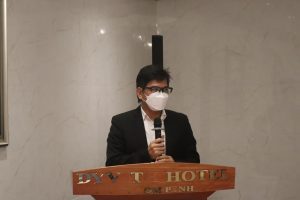 Mr. Oum Kosal, Assistant of FAO Representative, FAO Cambodia: This LNA workshop is important for relevant stakeholders from NGOs, farmer organization, private sector/agricultural cooperatives and academia especially the participation of women in order to provide the inputs to preliminary result of learning need assessment and validate them for designing capacity development program. Cambodia is agrarian country. Rural women have experience the declining of productivity, the loss of job and income. Women are vulnerable people who have been affected by Covid-19. The empowering women in agriculture and food systems through promoting responsible agriculture investment will help women to overcome the challenges and benefit from agriculture investment. Presently, FAO Cambodia continuing to promote gender equality and equity in agriculture in the country, through project/programme development and implementation. Thank to H.E Hor Malin and MAFF for supporting us as always and thank to AsiaDHRRA/CamboDHRRA for creating this initiative. We will work together for fruitful achievement.
Mr. Oum Kosal, Assistant of FAO Representative, FAO Cambodia: This LNA workshop is important for relevant stakeholders from NGOs, farmer organization, private sector/agricultural cooperatives and academia especially the participation of women in order to provide the inputs to preliminary result of learning need assessment and validate them for designing capacity development program. Cambodia is agrarian country. Rural women have experience the declining of productivity, the loss of job and income. Women are vulnerable people who have been affected by Covid-19. The empowering women in agriculture and food systems through promoting responsible agriculture investment will help women to overcome the challenges and benefit from agriculture investment. Presently, FAO Cambodia continuing to promote gender equality and equity in agriculture in the country, through project/programme development and implementation. Thank to H.E Hor Malin and MAFF for supporting us as always and thank to AsiaDHRRA/CamboDHRRA for creating this initiative. We will work together for fruitful achievement.
H.E Hor Malin, Secretary of State of Ministry of Agriculture Forestry and Fisheries (MAFF) and the Chair of the Child and Gender Working Group: First of all, thank to FAO and CamboDHRRA for giving me to deliver opening remark for this important LNA workshop. Cambodia is agrarian country and agriculture is a core sector in supporting economy of the country. Royal Government of Cambodia (RGC), MAFF developed agriculture sector development plan and agriculture master plan. Gender equality is mainstreamed through priority RGC strategies.
RAI will contribute to hunger and poverty reduction, and to the economic growth. I agreed with what Mr. Kosal and Mr. Sopheap mentioned and I’m so happy to see a lot of women participate in this workshop (gender equality)” H.E said. MAFF especially, gender and child working group commits to support this initiative to promote roles of women and youth to carry out and benefit from RAI toward poverty reduction and development.
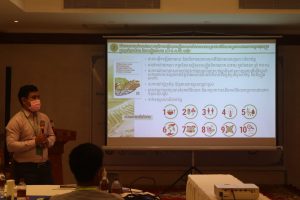 Mr. Him Noeun, Secretary General of CamboDHRRA presented the context of the workshop: Why Responsible Agriculture Investment and CFS-RAI Principles and ASEAN RAI Guidelines (focus on women and youth principles) along with presentation of Mrs. Siv Senith, FAO Cambodia on Understanding the context in Cambodia: Women and youth engagement in agricultural investment in Cambodia. It’s noted that in the context of Cambodia Women are ½ of the labour force and 2/3 work in agriculture and key productive roles, but 70% engage in vulnerable employment. Youth (aged 15-30) represent 34.8 % of the country’s population. Number of youths is expected to increase at a rate of 7.7 % a year over the next 5 years Migration is a central topic and Youth in agriculture: from 83.5 % in 1999 to 47.1 % in 2013 and continues to decline. Youth that do the work in agriculture mainly work on the family farm. It is important as well to be noted that gender and youth empowerment are among other prioritized cross-cutting issues in the current Country Programming Framework (CPF), 2019-2023 jointly developed by FAO and MAFF, and beyond.
Mr. Him Noeun, Secretary General of CamboDHRRA presented the context of the workshop: Why Responsible Agriculture Investment and CFS-RAI Principles and ASEAN RAI Guidelines (focus on women and youth principles) along with presentation of Mrs. Siv Senith, FAO Cambodia on Understanding the context in Cambodia: Women and youth engagement in agricultural investment in Cambodia. It’s noted that in the context of Cambodia Women are ½ of the labour force and 2/3 work in agriculture and key productive roles, but 70% engage in vulnerable employment. Youth (aged 15-30) represent 34.8 % of the country’s population. Number of youths is expected to increase at a rate of 7.7 % a year over the next 5 years Migration is a central topic and Youth in agriculture: from 83.5 % in 1999 to 47.1 % in 2013 and continues to decline. Youth that do the work in agriculture mainly work on the family farm. It is important as well to be noted that gender and youth empowerment are among other prioritized cross-cutting issues in the current Country Programming Framework (CPF), 2019-2023 jointly developed by FAO and MAFF, and beyond.
Taking the floor of discussion and validation the LNA, Mrs. Youn Senghor, SME facilitated the whole processes of discussion under supported by Mr. Him Noeun as co-facilitator. The discussion followed by presentation and instructions of Activity 1: Marketplace, review of target audience groups description, areas of responsibilities, and key activities. Next was the presentation and instructions of Activity 2: Review of key activities and sub-activities by target audience groups. After that was group work activity 2: Participants review, edit and integrate their activities and sub-activities, for each group to carry them out effectively (to achieve the goal of fostering gender equality and empowering women and youth in investments in agriculture and food systems), peer review of group work, finalization of the work by groups integrating the peer review comments. Day 2 started with a presentation and instructions of Activity 3: Identification of knowledge needs, ggroup work: Identification of knowledge needs, finalization of the work by groups integrating the peer review comments, and followed by the presentation and instructions of Activity 4 and do prioritization exercise.
The workshop concluded with a wrap up by Mr. Him Noeun, Secretary General of CamboDHRRA, impressed by Mr. Noun Tum, board member of CamboDHRRA as representative of private sector and closing remark by Mr. Pan Sopheap, Chairman of CamboDHRRA.
In conclusion, the workshop proceeded smoothly. Based on the preliminary analysis previously undertaken to collect relevant information, each target group reviewed their key activities and identified their priority learning needs in term of knowledge and skills to be able to better support women and youth to engage in RAI and RAI-related policy-making processes.
 Cambodhrra Cambodian Partnership for Development Human Resource in Rural Area Association
Cambodhrra Cambodian Partnership for Development Human Resource in Rural Area Association
